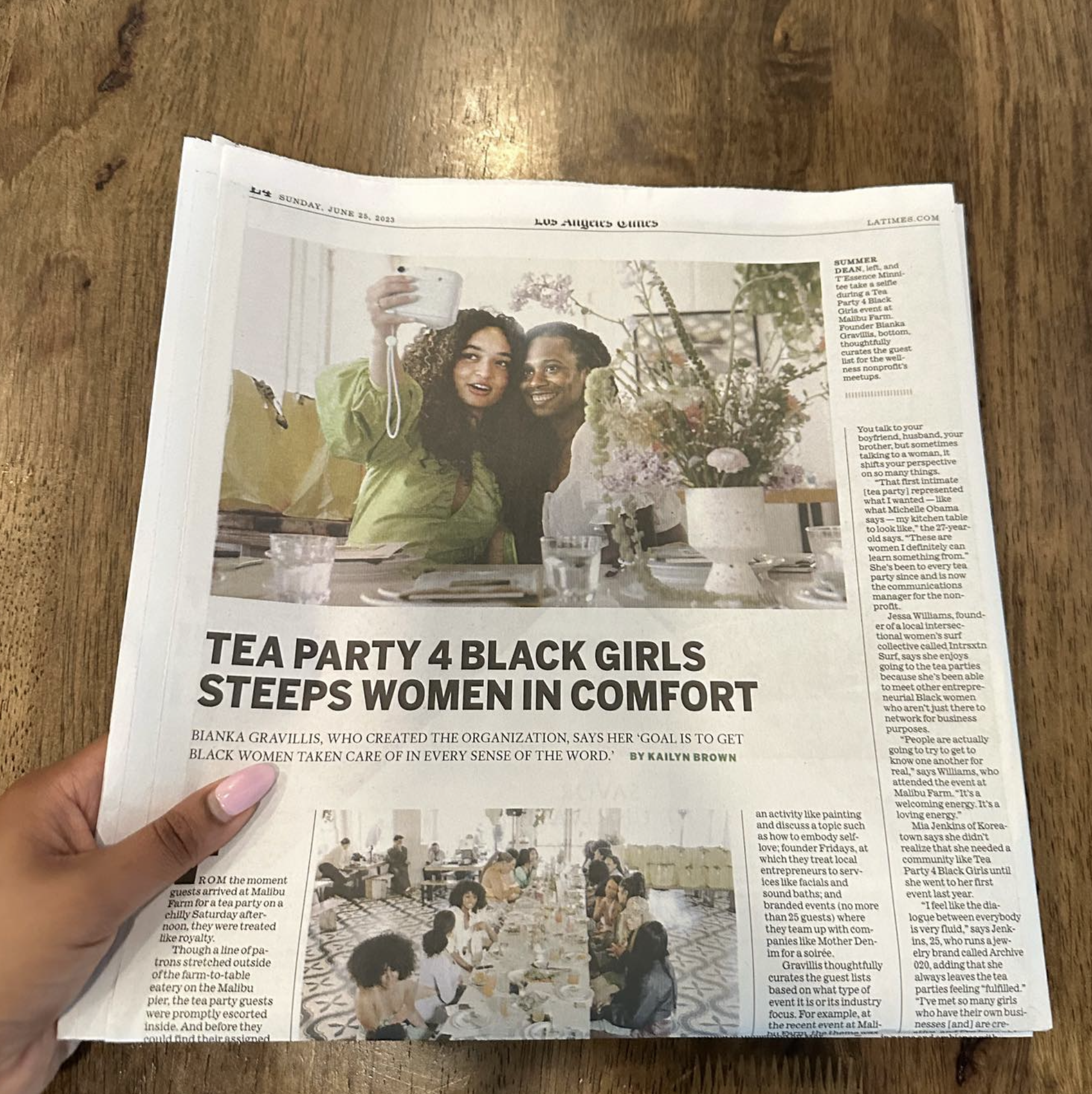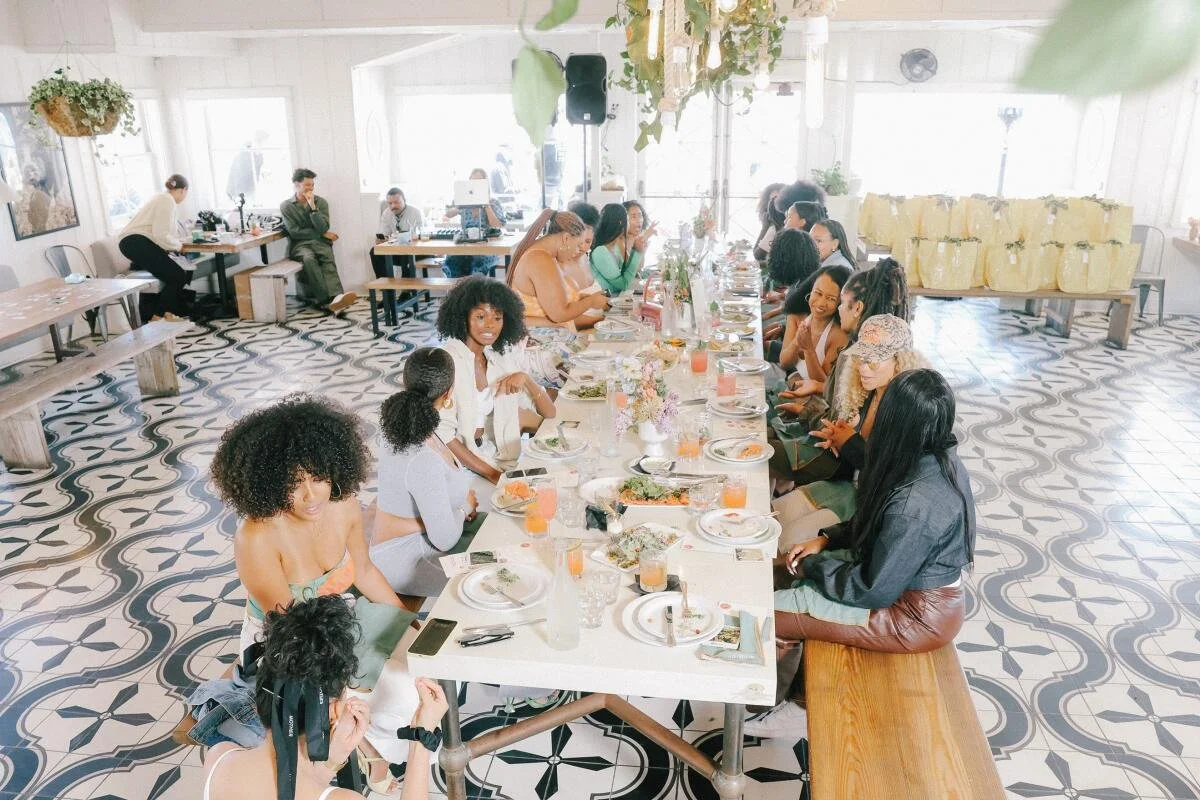Bianka Gravillis, Founder and Executive Director of Tea Party 4 Black Girls. (Credit: Everlane)
Bianka Gravillis is the founder and CEO of Tea Party 4 Black Girls, a Los Angeles-based nonprofit creating sacred, joyful spaces for Black women and nonbinary folks to heal, connect, and be celebrated. With deep roots in entertainment and entrepreneurship, Bianka launched the movement in 2022 to center Black wellness through intimate gatherings, community care, and cultural storytelling. Her work is a love letter to Black womanhood, rooted in luxury, liberation, and the belief that we all deserve to be seen, heard, and taken care of.
Even though you are a founder, you also decided to go to college. Share how your experience in college helped shape the way you attend to your work today?
BG: College definitely shaped my ability to manage multiple things at once. By the middle of my freshman year, I worked at Trader Joe's, I was an intern at a nonprofit, I interned for some YouTubers and I was taking a full class load. It taught me the power of being able to multitask and get as much done as possible. I looked at college like this gap of time that I could just see how much I could fit into. So when I left school I had all this experience under my belt because of the program I was in, it made it all worth it. As much as I was hesitant to go to college, I don't regret it. I'm grateful for the opportunity and the relationships that I've been able to make.
Tea Party 4 Black Girls co-host an IRL event. (Credit: Kailyn Brown)
You come from a family of entrepreneurs, as both your mother and father built their own design agency. How has their passion for building what they wanted to see exist in the world influenced how you created your own version of such with Tea Parties 4 Black Girls?
BG: I watched my mom put her company down to help my dad build an agency where they really partnered on building something together. My mom was incredible with talking with people and my dad is an incredible designer, together they were able to build something that sustained them. I learned that building a sense of community through work and how you treat people is so important. Opportunities will continue to come your way because people enjoy working with you. I think that’s where Tea Party comes in, I often feel like I've built Tea Party for the person that reminds me of my mom. The woman that's working a lot, trying to do something, has this active desire to push themselves and to be more than what they can imagine. But that comes with an extreme amount of pressure, self-doubt and lack of support. So it takes years to actually identify what that support looks like. Tea Party is for ironing out what the various realms of support are.
“I think that’s where Tea Party comes in, I often feel like I've built Tea Party for the person that reminds me of my mom. The woman that's working a lot, trying to do something, has this active desire to push themselves and to be more than what they can imagine.”
- Bianka Gravillis
Tea Party 4 Black Girls creates a space where Black women can feel free, cared for, and truly heard. Take us back to the moment you first knew a movement like this had to exist and what inspired you to choose the “tea party” motif as the gathering symbol?
BG: The Tea Party motif, funny enough I just liked how it sounded from a “spill the tea” but not in a gossipy way, but just from collectively getting together and talking way. When I knew Tea Party was going to be bigger than me was at our first and second party. At our first one, we had someone that I invited super duper last minute and I mean literally like hours before. I was like, “Do you want to come to this?” later she hit me up with the longest text message of her gratitude. She was a new mom and it was her first time being able to leave the house and just be with other women. It meant so much to her because it's such an intimate space. No one's rushing you, no one's kicking you out, we're all just sitting collectively, relaxing, drinking our tea infused tequila drinks or whatever it may be. That was one big moment for me that I saw how it impacted someone just on our very first one. Then we got our first brand partner and we got paid, it unlocked everything that I needed to do for Tea Party and I felt very motivated by creating resources for Black women. Then to be recognized for it when we got our LA Times feature was like monumental, it felt very full circle.
Tea Party 4 Black Girls host a wellness event. (Credit: Dania Maxwell / Los Angeles Times)
There are people who have a desire to create a collective addressing unmet needs. What advice would you have for someone looking to create their own? Where can they start with partnerships, funding, awareness, attendance.
BG: I'm a sucker for a deck, I've been making decks my entire life. I think if your message can be put concisely and in a way that people can receive and identify what you're trying to do, that's a great marker. If you're trying to serve an unmet community, data is your best friend. I became the queen of the cold email. My subject line in all my emails would be, “Support Black women.” You didn't respond to that? “Okay, heard that.” So I think it does start with just cold emailing and seeing who you know, going down the LinkedIn, Instagram rabbit hole. That's kind of been my method, at least my method for finding partners and just talking to people, telling people what you do.
As far as attendance, when you're building something authentic, people will come. And it doesn't mean people are going to come the first time or even the second time, but they'll come. I remember this moment that will stick with me forever. I hosted a black love mixer at a Black-owned bookstore in Los Angeles to bring some awareness to the bookstore . These two black girls came and I was talking to them and they're like, “Yeah, we just drove in.” “Driven from where?” I said. And they said, “Oh yeah, we drove from San Diego for this.” I almost burst into tears because I couldn't believe that someone drove over an hour to come participate in a moment like this just meant so much to me and it validated the work. And it's so important how you take care of them when they're there, how you attend to your guests, it's all time, it's all practice.
What role does representation play in helping the next generation believe that their dreams and aspirations are truly possible?
BG: I would say that representation is huge. I also think working with and reaching out to your ancestors via books, I think is super transformative. Anytime I read an autobiography, I always feel like I can find myself in the moment. I think when you're looking to create a community or create a space that you intend to be bigger than just you, you have to see what's been done before. There's no one person that I want to be just like, there's people that are very close and so collectively there's about five women and the attributes within them I want to carry for myself. There is a plethora of women and some men that I look at that I'm like “Okay I want to be able to run my company like this, I want to be able to have my hair look like that in order to be able to run my household like this.” But there's not one person that is all these things for me, which I actually think is quite important. You have to understand that we're not really reinventing the wheel here but that doesn't mean that there's not room or space for what we're building. And I think being able to take a peek at the past and take a peek at the now will inform how we act in the future. Learn from people and when you see something being done well, pay attention.
Want to hear more amazing stories like this? Check out our “More of Us” series! If you want to connect with Bianka and support the work she is doing, follow her on social @biankagravillis and @teaparty4blackgirlss, support her impact Tea Party 4 Black Girls.



